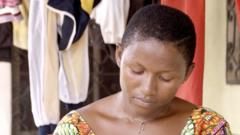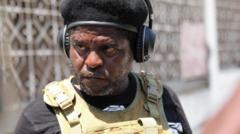The ongoing conflict in Cameroon, stemming from separatist movements in the anglophone regions, has led to devastating impacts on innocent civilians, with stories of abduction, loss, and fear as families grapple with the war's unrelenting brutality.
'Caught in the Crossfire: The Untold Struggles of Cameroonian Citizens'

'Caught in the Crossfire: The Untold Struggles of Cameroonian Citizens'
A dive into the ongoing conflict in Cameroon reveals the harrowing experiences of families caught between separatist violence and government crackdowns as they search for safety and stability.
In the South-West region of Cameroon, the brutal conflict between the government and armed separatists for the independence of the anglophone territories continues to plague local communities. Ngabi Dora Tue's sorrow reflects that of many as she mourns the loss of her husband, Johnson Mabia, who was killed by separatists four years ago. His death highlights the ever-present threat faced by residents in a war-torn area where the fight for independence has claimed thousands of lives.
Johnson, an English-speaking civil servant, was killed mere days after he was abducted by armed separatists. Their demands for a ransom of $55,000 were followed by heart-wrenching news—he had been murdered and decapitated. The widespread conflict has roots in long-standing grievances against the government's perceived neglect of the English-speaking minority, who feel marginalized since Cameroon's unification in 1972.
As protests began in late 2016 against the judicial encroachment from the predominantly francophone government, the situation escalated into a violent uprising. The government's brutal crackdown on demonstrators, marked by arrests and violence, only inflamed the conflict, leading to the formation of armed groups fighting for self-determination. Despite national dialogues intended to ease tensions, citizens like Felix Agbor Nkongho express disillusionment with both the separatists and government forces, noting a loss of trust among the populace.
The anguished tales of many civilians illustrate the dire consequences of this conflict. Journalists and locals recount waking up to dead bodies in the streets, fearing for their families and being subjected to torture by both government and separatist forces. One victim, who remained anonymous, described horrific torture after being accused of aiding separatists, illuminating the dangers that plague both sides of the conflict.
Attempts to assess the situation have been met with further violence, including attacks on schools that have severely disrupted education in the region, exacerbating future challenges for communities. Some groups have even emerged to fight against the separatists, leading to further complexities in an already fraught landscape.
Amid this chaos, individuals like Joe narrate chilling experiences of abduction, struggling against the constant threat of violence while seeking safety for their families. As authorities continue to search for a solution, Ngabi Dora Tue's struggles encapsulate the overarching crisis; she now faces the daunting task of moving forward without her husband.
This ongoing conflict, manifesting daily in loss and fear, exposes the harsh realities that millions of Cameroonians endure as they navigate life amid strife, despairing over their future while clamoring for peace and security. The separatists assert claims of operating under international law, complicating the dynamic by shifts in accountability for violence and suffering.
As this tragedy continues, the worldwide audience is urged to pay attention to the dire situation in Cameroon, where hope for reconciliation and stability remains elusive for many caught in the crossfire.



















